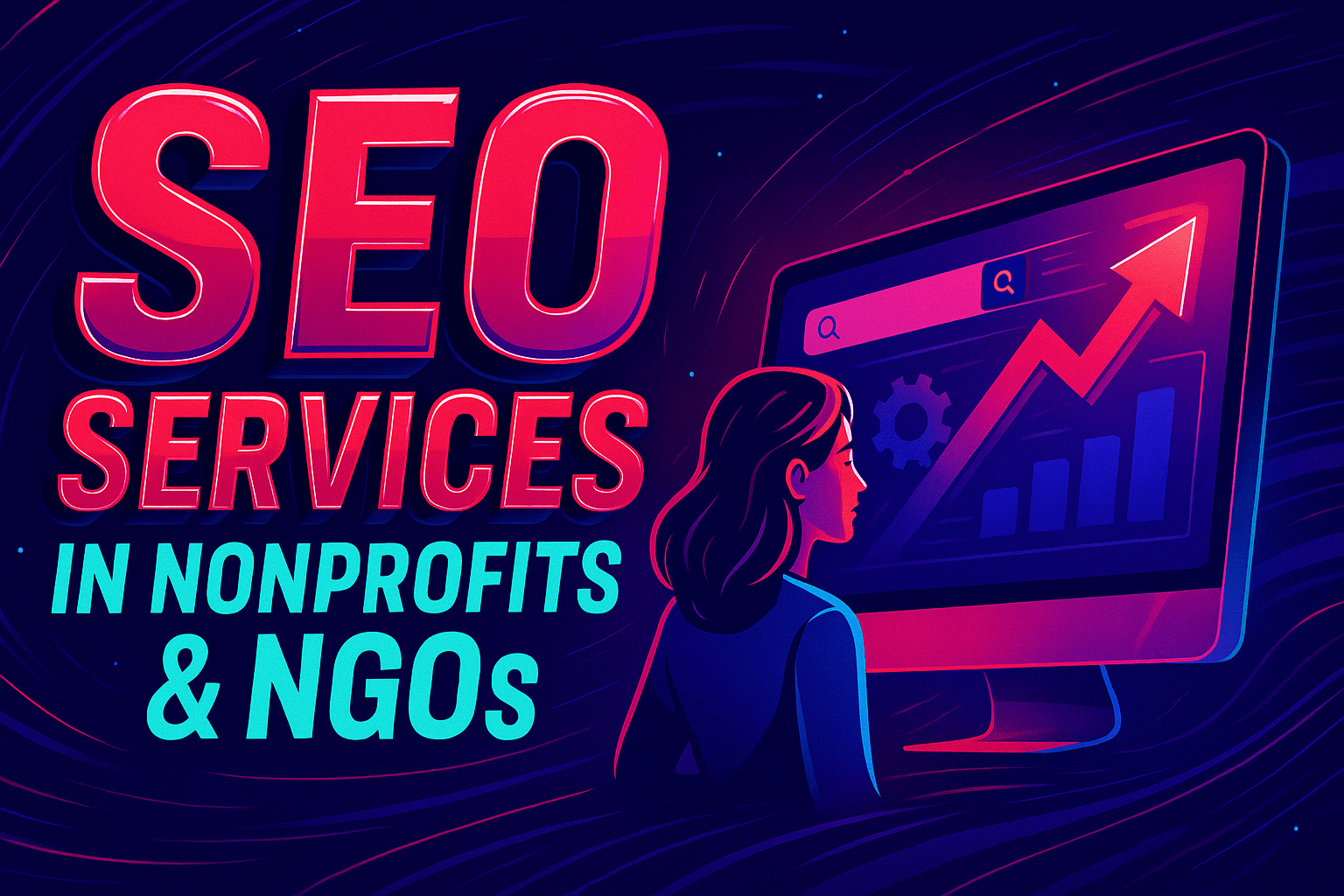Future-Ready: SEO Services for E-learning & Creators in 2026
by Design Delulu Editorial · October 1, 2025
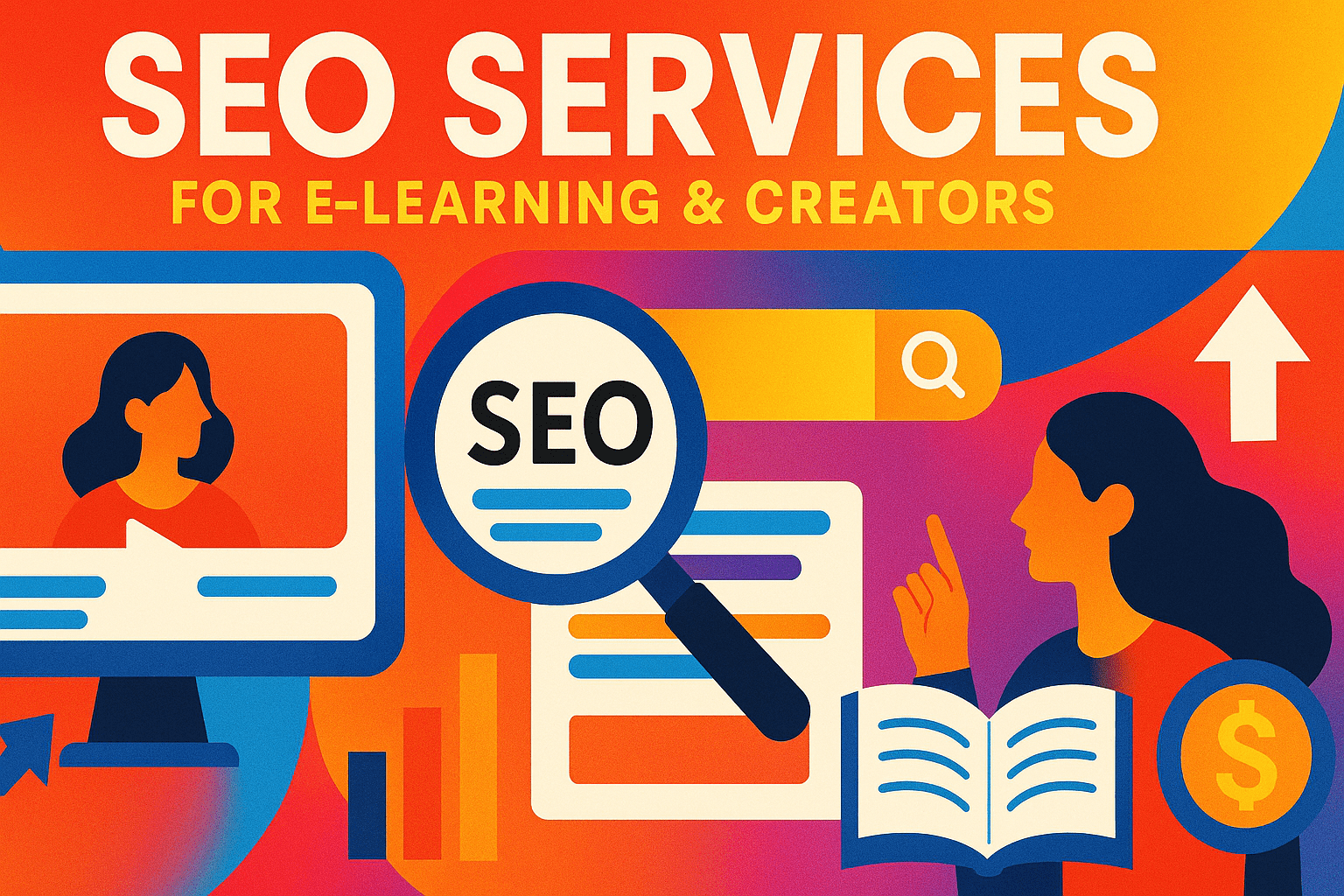
The e-learning landscape is transforming rapidly, with over 450 million learners now engaging with online courses, digital workshops, and creator-led content. As platforms multiply and competition intensifies, visibility becomes the single most critical factor separating thriving educational businesses from those struggling to reach their audience. Without strategic SEO, even the most valuable courses and creator content remain invisible to the learners actively searching for them.
Search engine optimization for e-learning platforms and content creators isn't just about rankings—it's about connecting educational solutions with learners at the exact moment they're searching for answers. Whether someone is typing "best python course for beginners" or "how to learn watercolor painting online," your content needs to appear when intent is highest. SEO services designed specifically for e-learning and creators bridge this gap, turning organic search into a predictable, scalable acquisition channel that compounds over time.
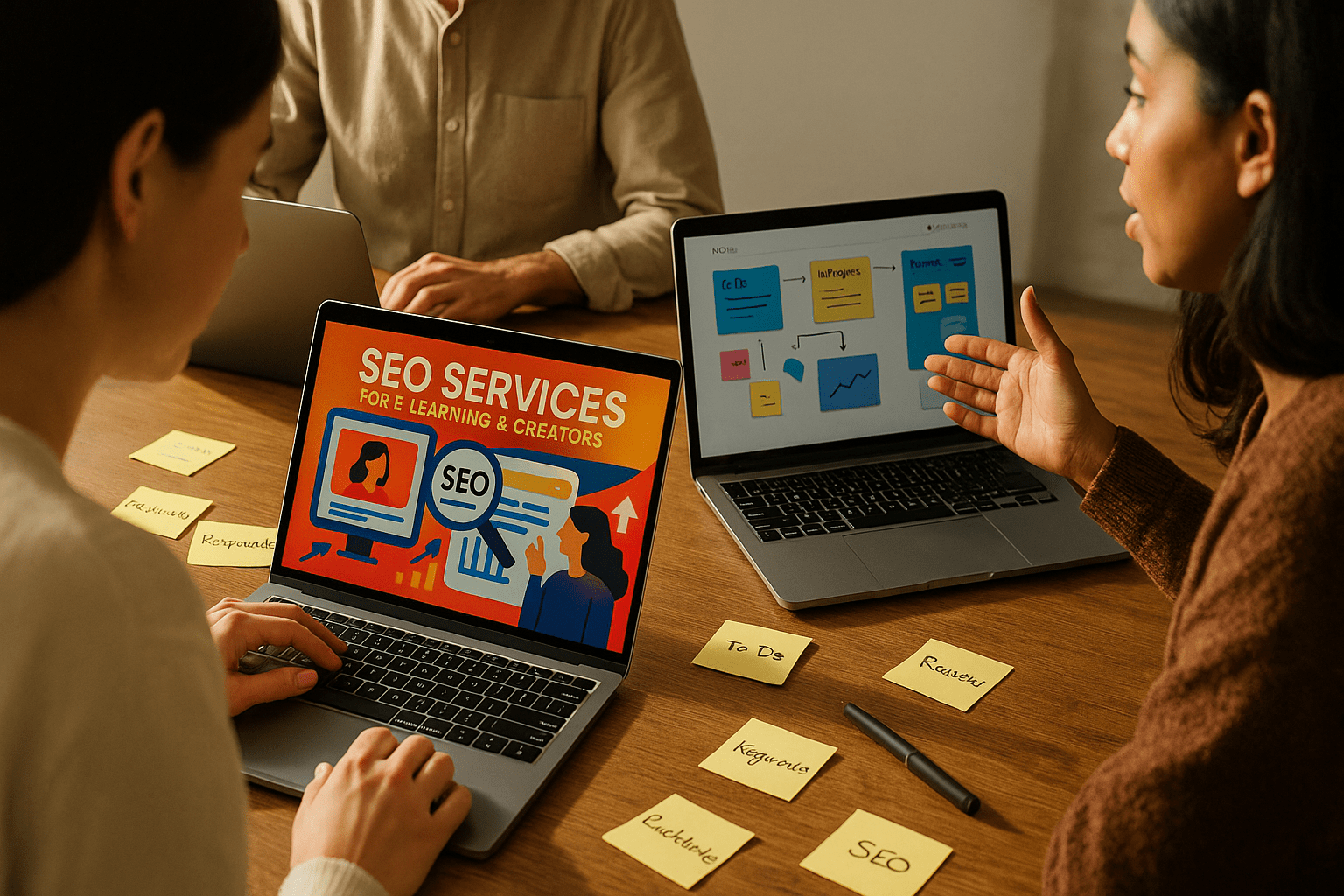
Why E-learning & Creator SEO Is Different
Educational content faces unique search challenges that generic SEO strategies simply can't address. Course platforms compete with free YouTube tutorials, Reddit threads, and established educational institutions—all vying for the same high-intent keywords. Creators must balance authority-building content with conversion-focused landing pages, while maintaining technical performance across video-heavy, resource-intensive platforms.
The search intent journey for educational buyers is also distinctly multi-staged. A potential student might search for "what is machine learning" in the awareness phase, progress to "best machine learning courses" during consideration, and finally evaluate "coursera vs udemy machine learning" before converting. Effective SEO services for e-learning map content to every stage of this journey, ensuring your brand appears throughout the decision-making process rather than just at the final transaction moment.
Additionally, e-learning SEO must account for rapidly changing course catalogs, seasonal enrollment periods, instructor profiles, student reviews, and structured data requirements that help search engines understand educational content. Schema markup for courses, reviews, instructors, and FAQs becomes non-negotiable, as does a content architecture that allows both topical authority and discoverability for individual courses or creator offerings.
Core Components of E-learning SEO Strategy
A comprehensive SEO approach for e-learning platforms and creators integrates keyword research tailored to educational search behavior, technical optimization for content-heavy sites, and content strategies that build topical authority while driving enrollments. Each component works synergistically to improve visibility, engagement, and conversion rates across the entire learner journey.
Search Intent Mapping & Keyword Architecture
Educational keywords span a wide spectrum from informational queries ("how to learn graphic design") to transactional searches ("adobe illustrator course certification"). Successful e-learning SEO begins with comprehensive keyword mapping that identifies high-volume, high-intent terms specific to your course offerings, creator niche, or educational vertical. This research reveals not just what people search for, but the questions they ask, problems they need solved, and language they use when evaluating educational options.
Beyond individual keywords, effective SEO requires building a semantic architecture that connects related topics, subtopics, and supporting content. For a photography course platform, this might mean creating hub pages for "portrait photography," "landscape photography," and "product photography," each supported by technique guides, equipment recommendations, and student showcases. This topical clustering signals expertise to search engines while providing comprehensive resources that keep learners engaged.
Technical SEO for Content Platforms
E-learning platforms and creator sites often struggle with technical SEO challenges unique to content-rich, media-heavy experiences. Video embeds can slow page speed dramatically. Course catalogs with thousands of pages create crawl budget issues. Dynamic filtering and search functionality can generate duplicate content. User-generated reviews and forums may create thin or low-quality indexed pages.
Professional SEO services address these challenges through strategic technical fixes: implementing lazy loading for video content, optimizing image compression without quality loss, creating proper URL structures for course hierarchies, using canonical tags to manage duplicate content, and setting up proper robots.txt and XML sitemaps to guide search engine crawlers toward high-value pages. Page speed optimization becomes especially critical, as educational content often competes with fast-loading blog posts and YouTube videos in search results.
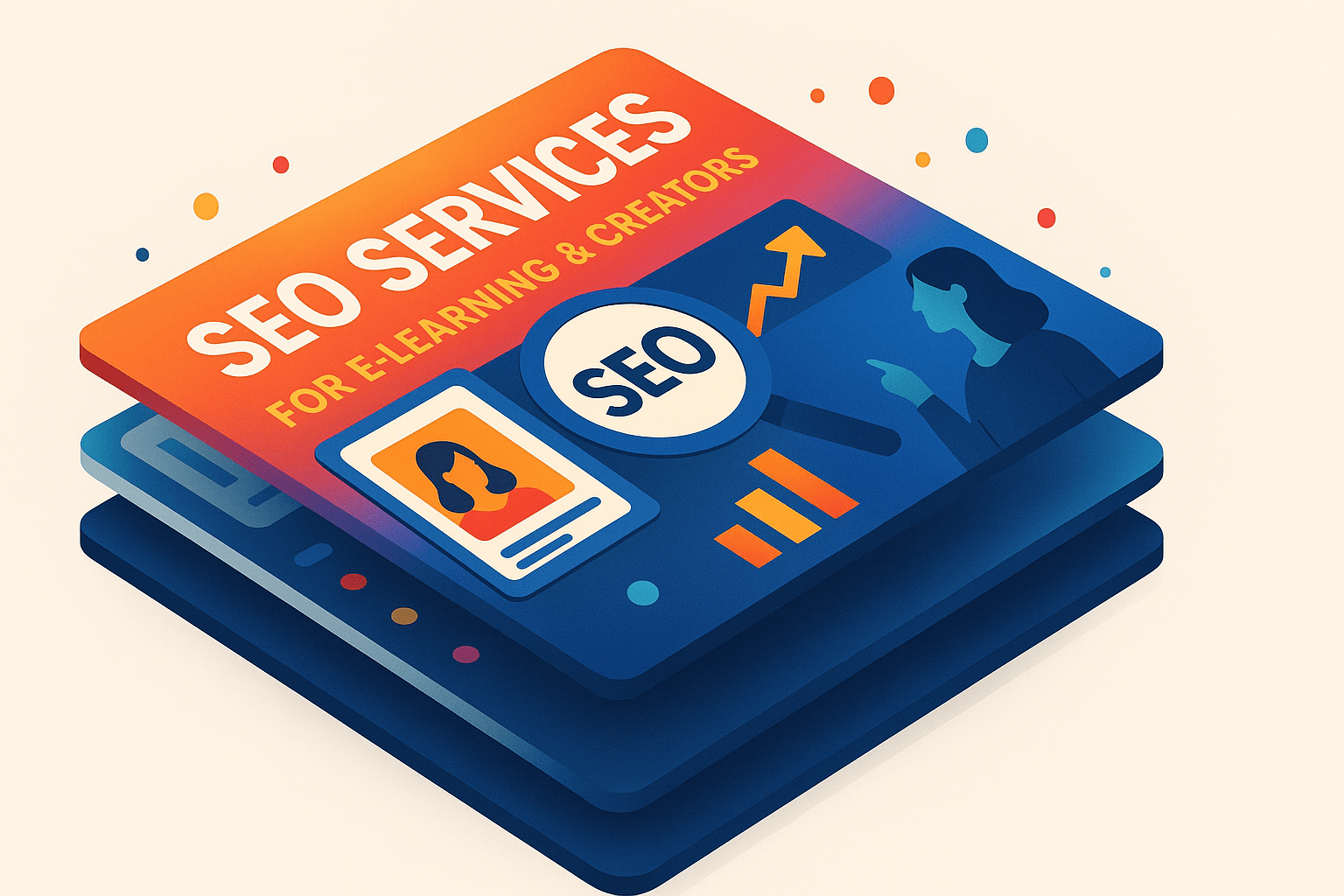
Schema Markup for Educational Content
Structured data transforms how search engines understand and display educational content. Course schema allows Google to show rich results with ratings, pricing, and provider information directly in search results. FAQ schema can earn featured snippet positions for common learner questions. Organization and Person schema builds authority for your platform and instructors. Review schema aggregates student testimonials into star ratings that appear in search listings.
Implementing proper schema markup isn't optional for competitive e-learning SEO—it's table stakes. Rich results attract significantly higher click-through rates, and structured data helps search engines confidently recommend your courses for relevant queries. This is especially valuable for voice search and AI-powered search experiences, where structured information determines which results get surfaced.
Content Hubs & Internal Linking Strategy
Content hubs organize related educational topics into comprehensive resource centers that establish topical authority. A language learning platform might build hubs for "Spanish Learning Resources," "French Grammar Guides," and "Language Learning Tips," with each hub containing 15-30 interconnected articles that cover the subject exhaustively. These hubs serve dual purposes: they satisfy learner information needs while signaling deep expertise to search algorithms.
Internal linking strategy connects these content hubs to conversion pages—course landing pages, creator profiles, and enrollment flows. Thoughtful internal links pass authority from high-performing content to revenue-generating pages, create clear navigation paths for learners, and help search engines understand site hierarchy and page relationships. Strategic anchor text usage ensures contextual relevance while avoiding over-optimization penalties.
Key Benefits for E-learning Platforms & Creators
- Predictable Learner Acquisition: Organic search becomes a consistent, scalable channel that delivers qualified prospects actively seeking educational solutions, reducing dependence on paid advertising and volatile social media algorithms.
- Higher-Intent Traffic: Search visitors arrive with specific learning goals and problems to solve, resulting in higher engagement rates, longer time-on-site, and better conversion rates compared to cold traffic from other channels.
- Compounding Returns: Unlike paid ads that stop delivering results when spending stops, SEO investments compound over time as content accumulates authority, rankings improve, and backlinks multiply organically.
- Brand Authority Building: Consistent visibility in search results for educational topics establishes your platform or creator brand as a trusted authority, influencing purchase decisions even when buyers don't immediately convert.
- Content Marketing Efficiency: SEO-optimized content serves multiple functions—attracting search traffic, nurturing leads through educational value, and supporting sales conversations with proof of expertise.
- Competitive Differentiation: Many educational platforms under-invest in SEO, creating opportunities for strategic competitors to capture market share by claiming valuable keyword territory and featured snippet positions.
- Better Understanding of Audience Needs: Keyword research and search console data reveal exactly what questions learners ask, which topics generate interest, and how educational buyers describe their problems—insights that inform product development and content strategy.
How E-learning SEO Services Work
- Discovery & Goals: We begin with comprehensive audits of your current SEO performance, competitor analysis, and stakeholder interviews to understand business objectives, constraints, and success metrics. This phase identifies quick wins, major opportunities, and technical debt that may be limiting visibility. We clarify target learner personas, priority course offerings or creator products, and revenue goals that SEO should support.
- Strategy & Blueprint: Based on discovery findings, we design a comprehensive SEO strategy including keyword architecture, content hub planning, technical optimization roadmap, and measurement framework. This blueprint specifies which keywords to target, what content to create, how to structure site architecture, and which technical fixes to prioritize. We map content to search intent stages and create a sequenced implementation plan that balances quick wins with long-term authority building.
- Implementation & Launch: The build phase executes the strategy through technical fixes, on-page optimization, schema implementation, content creation or optimization, and internal linking deployment. We work within your existing platform constraints and content management systems, providing templates and systems that enable ongoing execution. Quality assurance ensures all optimizations work correctly across devices and browsers, and tracking is properly configured to measure results.
- Measurement & Optimization: Post-launch, we monitor rankings, traffic, engagement, and conversion metrics through custom dashboards that connect SEO performance to business outcomes. Regular reporting identifies what's working, what needs adjustment, and where to double down. We iterate based on data, testing hypotheses about content performance, refining keyword targeting, and scaling successful tactics. Quarterly strategy reviews ensure SEO efforts remain aligned with evolving business priorities.
Core Deliverables
- Comprehensive Keyword Map & Content Plan: Detailed spreadsheet mapping target keywords to existing and planned content, with search volume, difficulty scores, intent classification, and priority rankings. Includes content gap analysis identifying opportunities competitors haven't addressed.
- Technical SEO Audit & Fixes: Complete technical assessment covering crawlability, indexation, site speed, mobile optimization, and structured data. Includes implementation of priority fixes and ongoing technical monitoring.
- Schema Markup Implementation: Course, FAQ, review, organization, and person schema deployed site-wide to enable rich results and improve search engine understanding of educational content.
- Content Briefs & Templates: Detailed briefs for priority content pieces including keyword targets, outline structures, competitor analysis, and SEO requirements. Templates for course pages, blog posts, and landing pages that scale content production while maintaining optimization standards.
- Internal Linking Architecture: Strategic linking plan that connects content hubs to conversion pages, with anchor text guidelines and implementation roadmap.
- Reporting Dashboards: Custom dashboards in Google Analytics, Search Console, and/or data visualization tools that track organic traffic, rankings, conversions, and revenue attributed to SEO channels. Includes automated reporting and alert systems.
- Ongoing Optimization Recommendations: Monthly or quarterly reports with data-driven recommendations for content updates, new keyword targets, technical improvements, and strategic pivots based on performance data.
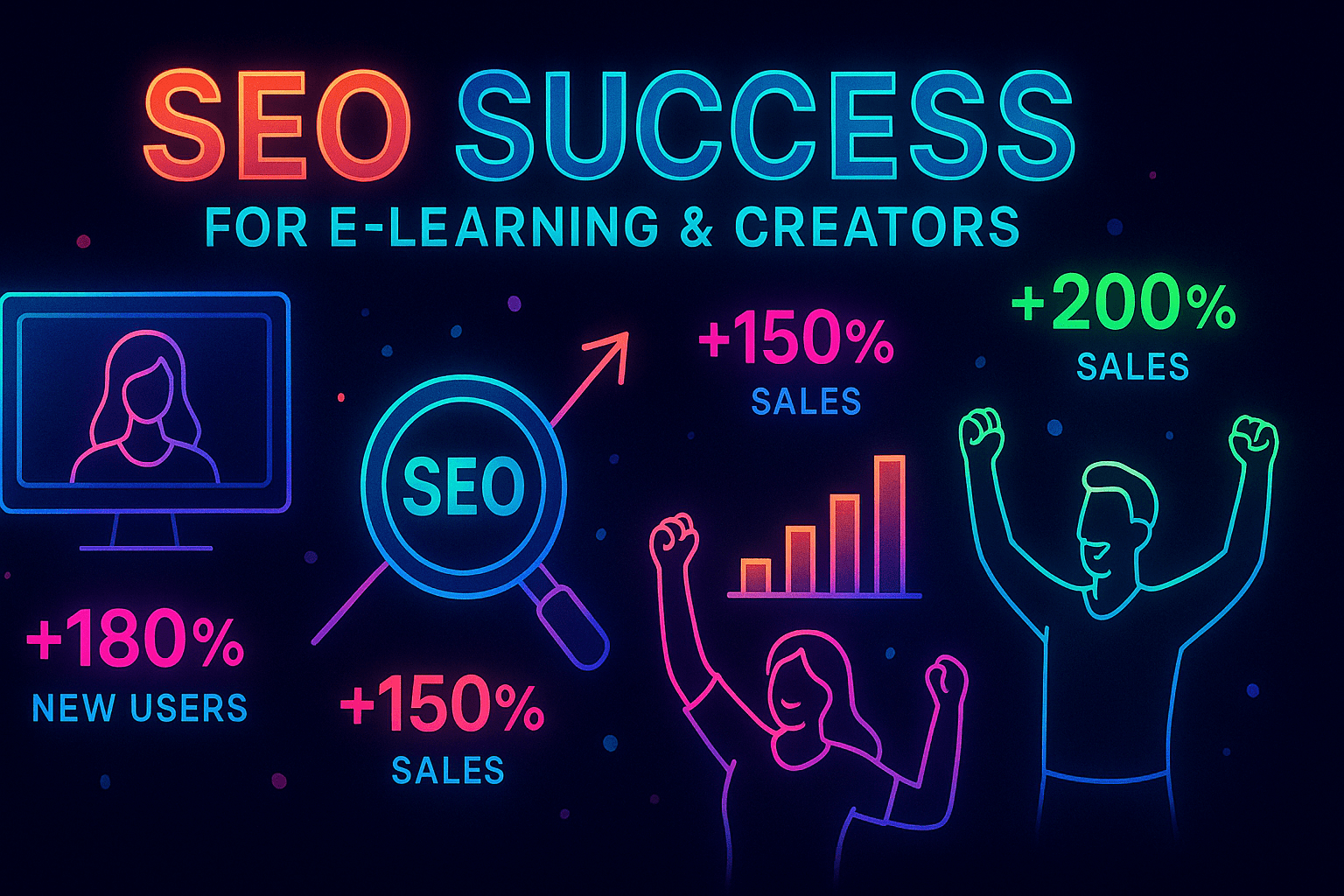
Best Practices for E-learning & Creator SEO
- Prioritize High-Impact Pages First: Focus initial optimization efforts on pages with existing traffic or rankings that could improve with optimization, and on high-value course or product pages that drive the most revenue. Quick wins build momentum and demonstrate ROI while longer-term authority-building efforts mature.
- Pair Creative with Measurement: Every content asset should have clear success metrics tied to business outcomes. Don't create content for content's sake—ensure each piece serves a strategic purpose in the keyword map and conversion funnel, with KPIs defined upfront.
- Use Templates and Systems to Scale: Create repeatable processes for content creation, on-page optimization, and technical maintenance. Templates for course pages, blog posts, and landing pages ensure consistency while enabling faster production. Checklists and standard operating procedures make SEO sustainable as teams grow.
- Build Topical Authority Through Depth: Rather than superficially covering many topics, go deep on fewer subjects. Comprehensive coverage of specific educational topics signals expertise more effectively than thin content spread across many keywords. Aim for exhaustive resource centers that become definitive sources.
- Optimize for Featured Snippets: Educational queries frequently trigger featured snippets for definitions, how-to steps, and comparison tables. Structure content to target these opportunities with clear headings, concise answers, and formatted lists or tables that Google can easily extract.
- Leverage Student Success Stories: Case studies and testimonials from successful learners provide both social proof and long-tail keyword opportunities. "How I learned web development with [your course]" content attracts search traffic while building credibility.
- Close the Loop with Regular Reviews: Weekly reviews of key metrics keep teams aligned and enable rapid response to ranking changes or traffic drops. Quarterly strategic resets ensure SEO efforts evolve with business priorities, market changes, and search algorithm updates.
- Integrate SEO with Other Channels: SEO content can be repurposed for email campaigns, social media, and paid advertising. High-performing organic content identifies topics and messages that resonate, informing creative strategy across all marketing channels.
Industry-Specific Strategies for E-learning & Creators
- Map Search Intent to Learning Journey Stages: Educational buyers progress through awareness ("what is data science"), consideration ("best data science courses"), and decision ("coursera data science review") stages. Create content for each stage, using informational content to build awareness and trust, comparison content to assist consideration, and detailed course pages with strong social proof to close conversions.
- Optimize for Course Comparison Queries: Many educational buyers search for comparison content before purchasing. Create comprehensive comparison pages and honest evaluations that help buyers make informed decisions. Even if you're comparing your offerings to competitors, helpful comparison content builds trust and captures high-intent traffic.
- Implement Student-Generated Content Strategies: Reviews, testimonials, project showcases, and student forums generate unique content that targets long-tail keywords while providing authentic social proof. Moderate and structure this content to ensure quality while allowing the authentic voice that search engines reward.
- Target Skill-Based and Outcome-Oriented Keywords: Learners often search for outcomes ("learn to build mobile apps") rather than specific courses or technologies. Content that addresses goals and outcomes rather than just curriculum details captures broader audiences and aligns with how people actually search.
- Create Resource Libraries and Tools: Free tools, templates, worksheets, and resource libraries attract backlinks and social shares while establishing authority. A language learning platform might offer free verb conjugation tools or vocabulary lists that rank for specific terms while introducing users to paid course offerings.
- Optimize for Voice Search and Conversational Queries: Educational searches increasingly happen through voice assistants and conversational interfaces. Optimize for natural language queries ("how do I learn Spanish fast") and question formats that reflect how people speak rather than type.
- Build Instructor Authority: For creator-led platforms, instructor profiles optimized with schema markup, comprehensive bios, and content showcasing expertise help establish personal brands that complement course offerings. Individual instructor authority boosts overall platform credibility.
- Measure Against a Single Source of Truth: Consolidate SEO metrics into one dashboard that connects organic traffic to actual business outcomes—course enrollments, revenue, and customer lifetime value. Avoid vanity metrics in favor of KPIs that demonstrate ROI and justify continued SEO investment.
- Ship Small, Test Fast, Keep Compounding Wins: SEO is a marathon, not a sprint, but momentum comes from consistent small improvements rather than massive infrequent campaigns. Launch content incrementally, measure what works, iterate quickly, and compound successes over time.
Common Challenges & Solutions
Challenge: Competing with Free Content
E-learning platforms and creators often compete with free YouTube tutorials, blog posts, and open educational resources. The solution isn't to ignore this reality but to address it directly: create content that acknowledges free alternatives while articulating your unique value—structured learning paths, certificates, community access, instructor feedback, or comprehensive coverage that free content can't match. SEO content should help buyers understand why paid offerings deliver better outcomes despite free alternatives.
Challenge: Keeping Content Fresh with Rapid Subject Matter Changes
Technology courses, business training, and many creator topics evolve rapidly, risking outdated content that damages SEO performance. Implement content maintenance schedules that review and update priority pages quarterly. Add "last updated" dates to signal freshness. Create evergreen frameworks that remain relevant even as specific tools or techniques change. Build update processes into content creation workflows from the start rather than treating updates as reactive maintenance.
Challenge: Balancing Educational Content with Conversion Goals
Informational content attracts traffic but doesn't always convert. The key is strategic internal linking and content progression that guides learners from awareness to consideration to decision. Educational content should include contextual CTAs that invite next steps without aggressive sales language—"Ready to go deeper? Check out our comprehensive course" feels natural after a helpful blog post. Measure content not just by traffic but by assist conversions that contribute to multi-touch attribution.
Frequently Asked Questions
Let’s level up your E-learning & Creators business
Need services that actually move the needle for E-learning & Creators? See our approach, pricing, and timelines—then book a quick call.
Additional Resources
- Schedule a Strategy Call
Book a complimentary 30-minute consultation to discuss your e-learning platform's SEO challenges, goals, and opportunities. We'll review your current performance and outline potential strategies tailored to your specific business model and target audience.
- View Our Portfolio
Explore case studies and examples of successful SEO strategies we've implemented for e-learning platforms, course creators, and educational technology companies. See real results, traffic growth charts, and ranking improvements from past engagements.
- Free SEO Tools & Resources
Access free tools, templates, and resources for e-learning SEO including keyword research worksheets, content brief templates, technical SEO checklists, and schema markup generators designed specifically for course platforms and creator businesses.
Related Reading

Transform your real estate business with data-driven SEO services. Increase organic traffic, generate qualified leads, and dominate local search results with proven strategies.
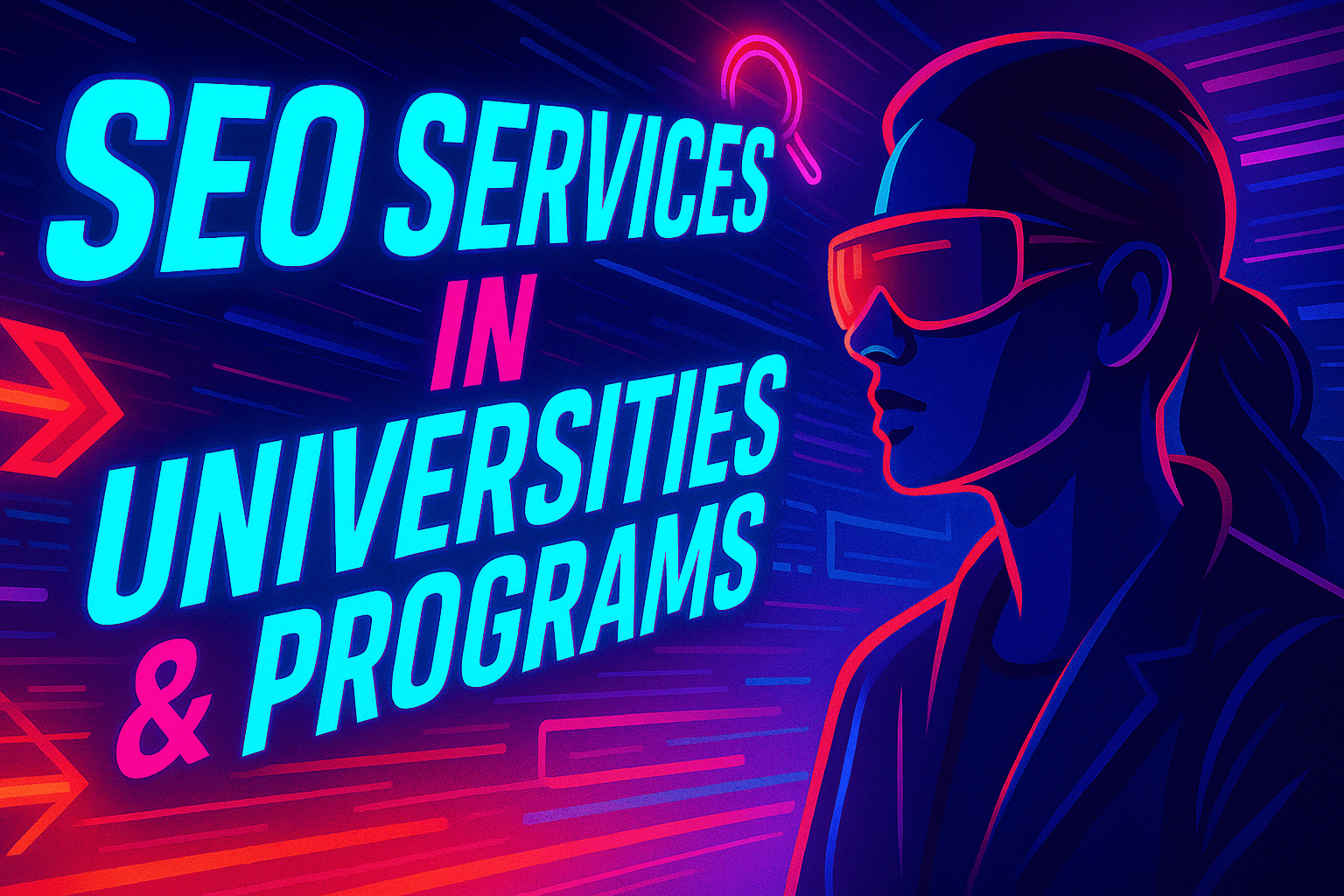
Transform university enrollment with proven SEO strategies. Get search intent mapping, technical optimization, and content frameworks that drive qualified student applications in 4-8 weeks.
